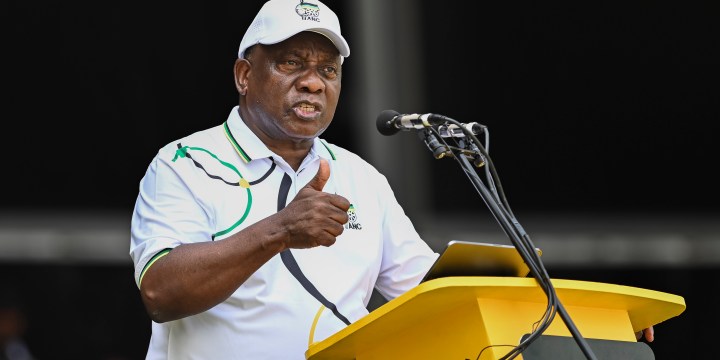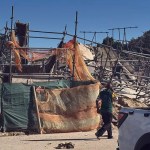BUSINESS REFLECTION
Loaded for Bear: ANC’s push for raw material export taxes to spur ‘local value’ is a bad idea

In its election manifesto, the ANC says it will impose export taxes on raw materials such as platinum to ‘encourage local value addition’. This will likely be counterproductive. A better idea on this front would be to keep the lights on and maintain functional ports.
The ANC, which has overseen a failing state and the de-industrialisation of Africa’s most industrialised economy, has a new policy to spur local manufacturing.
In its election manifesto released on Saturday, the governing party says it will:
“Implement export taxes on essential raw materials like cobalt, lithium, graphite, chromite, manganese and platinum to encourage local value addition, particularly for low-carbon production.”
This follows remarks President Cyril Ramaphosa made during the ANC’s annual 8 January statement, in which he said the party’s youth league had made it clear that “we are tired of being a country that exports all our mineral resources … without beneficiating them”.
Read more in Daily Maverick: Loaded for Bear: For better or worse, the ‘beneficiation’ of minerals is back on the African agenda
If such taxes were imposed – and that’s a big if, as the ANC is widely expected to lose its majority status in Parliament for the first time in the democratic era – the consequences would unlikely spur “local value addition” while robbing South Africa of key export earnings.
Here’s a useful summary of how such taxes work from a World Trade Organization (WTO) paper on the subject:
“A ban or a tax on exports implemented by a large country depresses the domestic price of the taxed commodity, increases the international price and reduces the volume of trade,” it says.
Read more here: The Role of Export Taxes in the Field of Primary Commodities
The thinking behind such a tax in ANC circles goes roughly like this: less of the raw material will be exported to countries that require it for manufacturing products such as cellphones, laptops and cars, thereby allowing local manufacturers to boost their production thanks to access to cheaper supplies of the taxed commodity.
It’s a strategy that does not always produce the desired results and is a variation of the “import substitution” policies that have been pursued previously by many governments, including, notably, the apartheid regime.
A loss of efficiency and distortions in consumption are among the many consequences of such a policy.
“Consumption distortions result from the fact that too much of the taxed good is consumed domestically, because of the reduced domestic price, while foreign consumers consume too little,” the WTO says.
In that scenario, there are mostly losers and few winners.
Over three years ago, the South African government toyed with the idea of an export tax on chromite to boost local industry. Ferrochrome is processed from chrome ore and is a key ingredient in the production of stainless steel.
Read more in Daily Maverick: Proposed chrome export tax: Report highlights the risks and pitfalls
At the time, a group of South African chrome producers commissioned economics consultancy Genesis Analytics to assess the proposed tax and its potential consequences.
The assessment highlighted the pitfalls of the proposed policy, which was not imposed and was aimed at Chinese competitors.
“Whilst export taxes on raw materials in the metals value chain have been used to improve downstream beneficiation, the aim of the mechanism has primarily been to secure domestic supply. To the best of our knowledge, there are no clear examples of where an export tax has been used … to directly disadvantage other international downstream competitors.
“In this regard, the logic of the proposed tax on chrome ore in South Africa is somewhat novel,” it said.
Those “downstream competitors” are found almost exclusively in China, which also consumes a lot of other South African commodities.
And while South Africa has the raw materials, it does not have its export clients over a barrel.
“In order to benefit South African ferrochrome producers, it is necessary for the tax to sufficiently incentivise stainless steel producers in China to shift away from Chinese ferrochrome supply to South African producers; and/or accept a higher price for the South African product,” the report noted.
Its ultimate conclusion was that the tax would be harmful.
“… contrary to the government’s goal, the proposed tax would result in a material probability of significant job losses (approximately 10,000 direct jobs and 34,000 indirect jobs) across South African chrome mines, with little hope of a compensating effect in the ferrochrome industry.
“Furthermore, we found that the main ailment of the ferrochrome industry was not a shortage of relatively lower cost raw material inputs, as previously misdiagnosed, but rapidly increasing electricity costs.”
Read more here: Genesis report shifts debate on proposed chrome ore export tax
With a far wider raw material export tax now on the cards, it’s worth exploring these implications.
If South Africa’s overseas clients do accept the higher price for raw materials, that means the costs will be passed on to consumers of the finished product – including in South Africa.
And who is going to switch their production to South Africa to take advantage of the cheaper commodities on the domestic market?
A company cannot commit investment into South Africa to build things like factories or smelters when the power supply remains unreliable, the rail and ports networks are dysfunctional, the water systems are leaking, and crime and corruption are rampant.
South Africa’s potholed path down the road of de-industrialisation has been paved by state failure. Getting the basics of power supply and logistics right is the prerequisite for a renewed industrialisation drive, not a tax on the country’s key exports.
A reduction in foreign demand for such commodities will also hurt South Africa’s earnings of hard currency – this stuff is priced in dollars – which in turn will undermine the country’s trade balance, terms of trade and ultimately the fragile rand.
The thinking seems to be that products manufactured from such commodities will fill that export space, and create loads of jobs in the process.
But you can’t make stuff and ship it out without reliable power and ports. Companies such as Kumba Iron Ore have had to cut production and jobs because of Transnet’s meltdown.
Because of these issues, South Africa hardly has the domestic demand to absorb the manganese, chromite, or platinum group metals that overseas customers may buy less of because of the increased prices imposed by the export tax.
That, in turn, will see mining companies slash production and jobs further, while the promised utopia of more factory jobs turns out to be a dystopia of higher unemployment and further deindustrialisation.
The bottom line is that this is a populist policy that does nothing to address the root causes of South Africa’s unfolding economic and industrial decline.
At least for now, it’s merely on the wish list of a party staring down the barrel of possible election defeat. DM


















Would this sort of thinking be coming from those loons such as Mantashe and Patel
Quite probably, but Cyril also refers to direction given by that esteemed think-tank the ANC Youth League…
The ANC will literally look for any way to shuffle those Titanic deck chairs and extract money from our economy, which is failing simply because they don’t even have a clue.
The even bigger concern is that there every indication that they don’t even have a clue they are clueless.
Free market equilibrium is already in place. No power, not investment, no logistics… no brains, no headache! SA cannot compete with Chinese alloy costs of production. Zim tried this twice and crashed badly both times! All that will happen is that SA will loose massive in-flows of hard currency and the ZAR will crash faster than a lead balloon. Unfortunately there are a few people who think they are smarter than history.